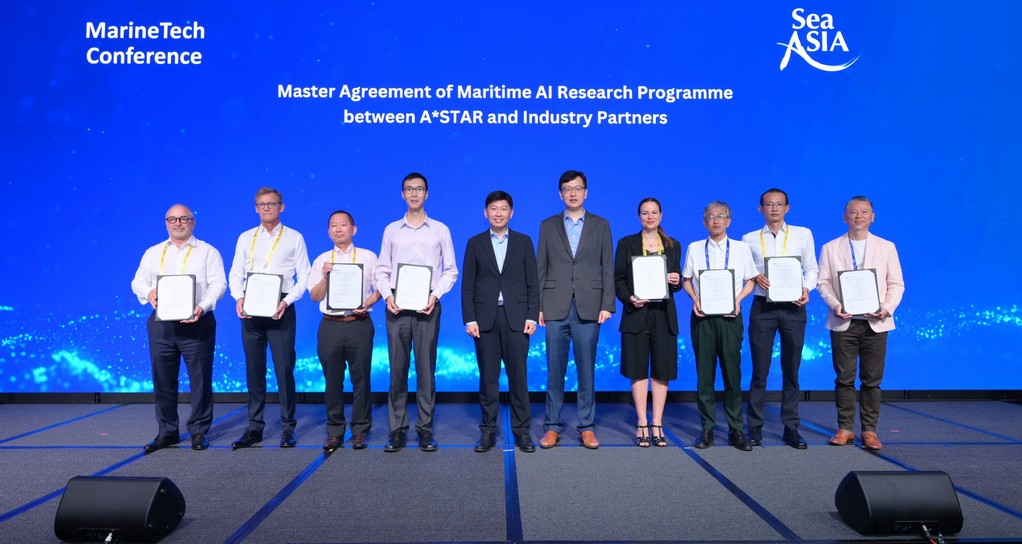METIS Cyberspace Technology will be collaborating with MTI Co. Ltd. Singapore Branch and the Agency for Science, Technology and Research (A*STAR) in Singapore to advance the use of AI for the predictive modelling of ship emissions and carbon intensity indicator (CII) evaluation.
The undertaking is part of a master agreement framework for co-developing AI and other digital technologies announced during the MarineTech Conference as part of the Singapore Maritime Week, where A*STAR established a Centre for Maritime Digitalisation (C4MD). The C4MD is led by A*STAR’s Institute of High Performance Computing (IHPC). Signatories of the master agreement framework comprise: A*STAR, American Bureau of Shipping, Bureau Veritas Marine & Offshore, DNV, METIS Cyberspace Technology (Singapore) Pte Ltd, Nippon Kaiji Kyokai, MTI Co. Ltd., PSA Marine (Pte) Ltd and ShipsFocus Services Pte Ltd.
The METIS-MTI-A*STAR project will focus on the way AI-based solutions can help shipping adjust to the International Maritime Organization’s Carbon Intensity Indicator (CII). Entering into force from 1 January 2023, the CII rates ships on the basis of CO2 emissions by transport work from A to E, expecting them to achieve a C rating or better, or explain how they will do so. However, the relationship between the KPI and the factors determining ship behaviours has not been fully studied.
“The Centre for Maritime Digitalisation (C4MD) hosts and supports innovative maritime R&D initiatives in Singapore such as the flagship Maritime AI Research Programme. The translation and application of research capabilities across the value-chain will contribute to a safer, more efficient and more sustainable maritime industry, and strengthen Singapore’s competitiveness in the maritime sector,” said Dr Su Yi, Executive Director, A*STAR’s IHPC.
Eleni Polychronopoulou, President & CEO, METIS Cyberspace Technology, signed for METIS, with Singapore Managing Director Chinmoy Ghose as witness.
“We are delighted to work with A*STAR’s IHPC and MTI on one of the key projects announced as part of the launch of C4MD,” said Polychronopoulou. “Owners face multiple options on how they improve their CII performance, and making the wrong choice can be costly. This project’s first target is to make the relationship between fuel consumption/emissions and the CII rating more transparent by taking full account the ship profile. Subsequently, we aim to develop a simulation platform to model future voyages and evaluate the real-time CII compliance status of a ship.”
An owner establishing a CII rating, or how to improve it, can consider factors including adjusting a ship’s sailing time ratio, speed profile, voyage profile, hull and propeller condition, specific fuel oil consumption, electrical consumption, trim, draft, or an engine de-rating. Modelling based on AI offers the opportunity to consider ‘what-if’ scenarios and assess how new methodologies or technologies can be introduced to reduce emissions without compromising operational performance, said Polychronopoulou.
Source: METIS CYBERSPACE TECHNOLOGY.
Tags: A*STAR, CII, METIS, MTI



Recent Posts
Höegh Autoliners’ Fifth Aurora-Class PCTC Enters Service with Multi-Fuel Capability
Next-Gen Marine Propulsion: MAN Launches Methanol Super Engine
Port of Amsterdam Marks First Ship-to-Ship Methanol Bunkering
Altair and HD Hyundai Heavy Industries Partner to Propel AI-Driven Eco-Friendly Marine Engine Innovation
Newfoundland and Port of Amsterdam Forge Green Hydrogen Partnership
India charts green shipping path: MEPC 83 outcomes discussed at IMEI-DG tech seminar
IME(I) Mumbai pioneers holistic development for future mariners with emotional resilience workshop
Adani launches India’s first hydrogen-powered truck